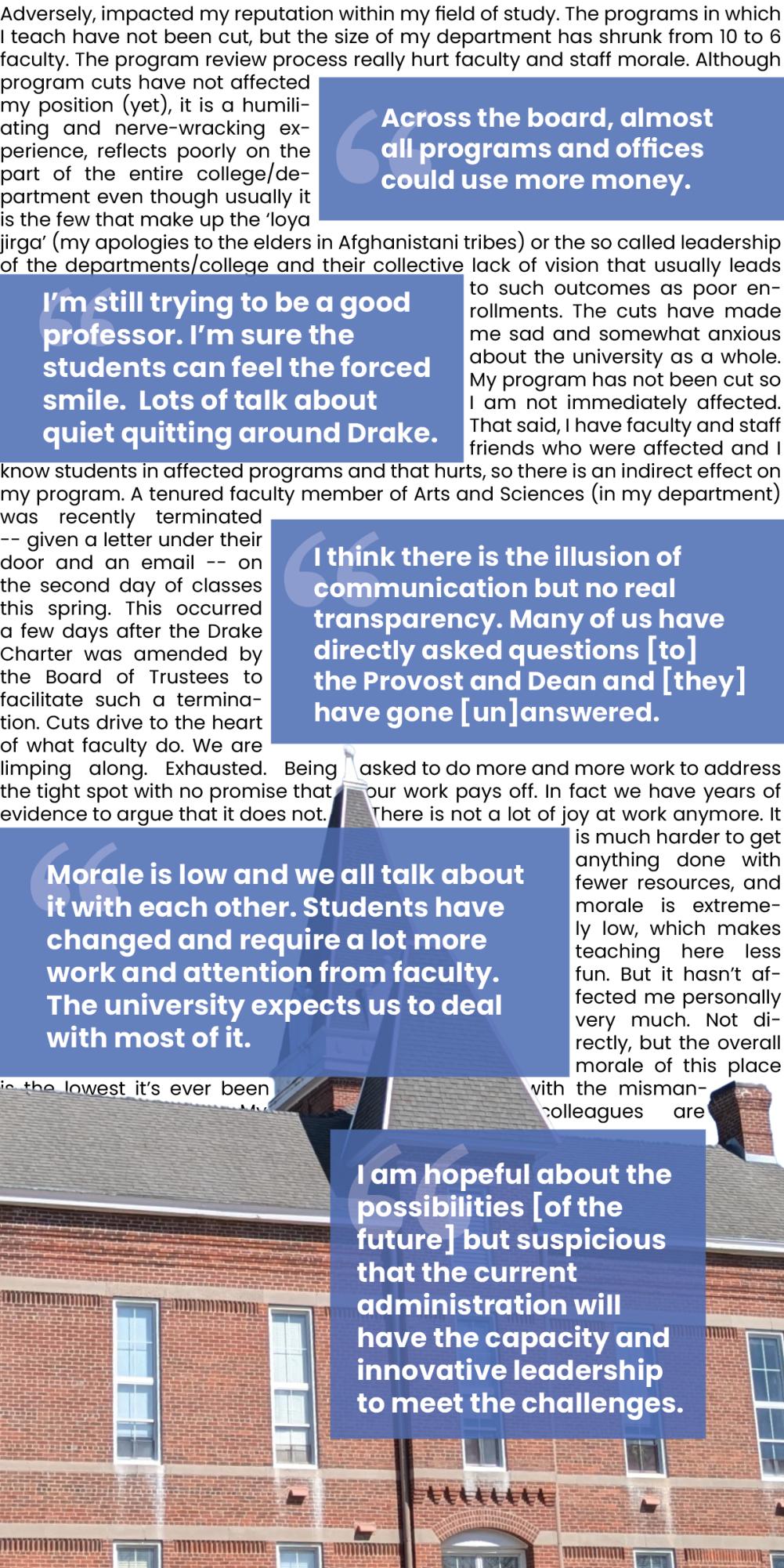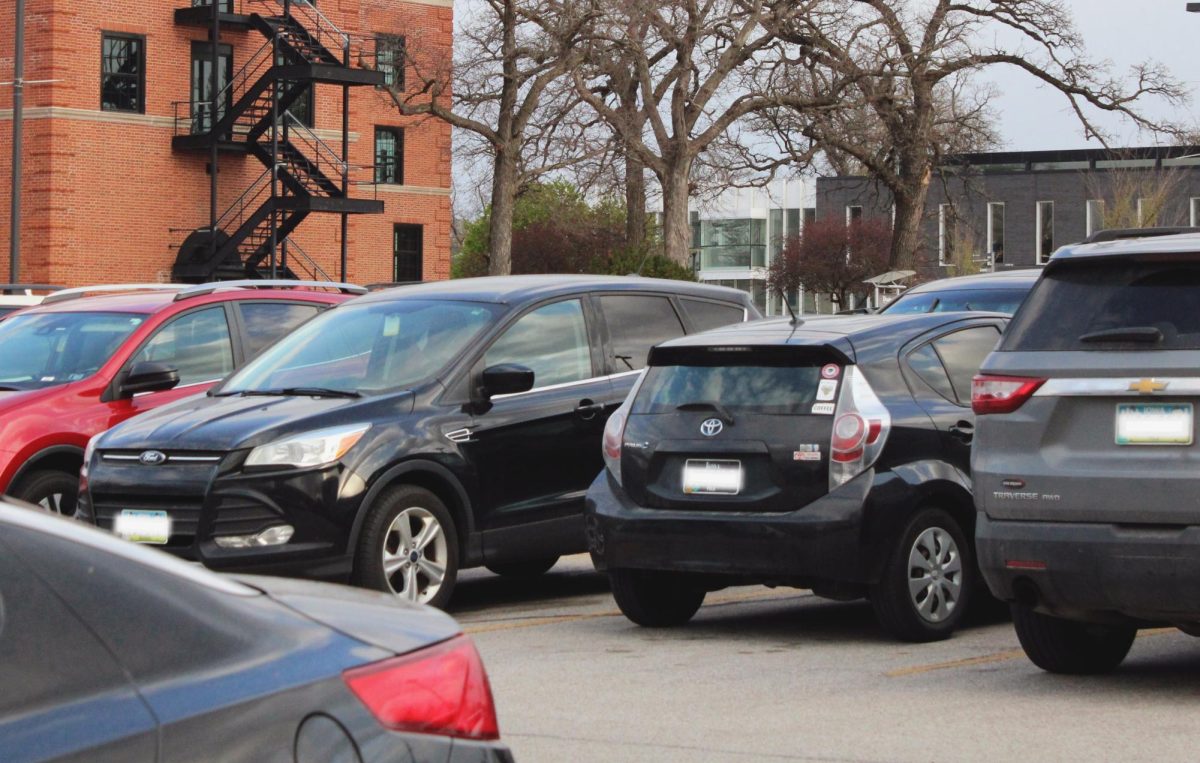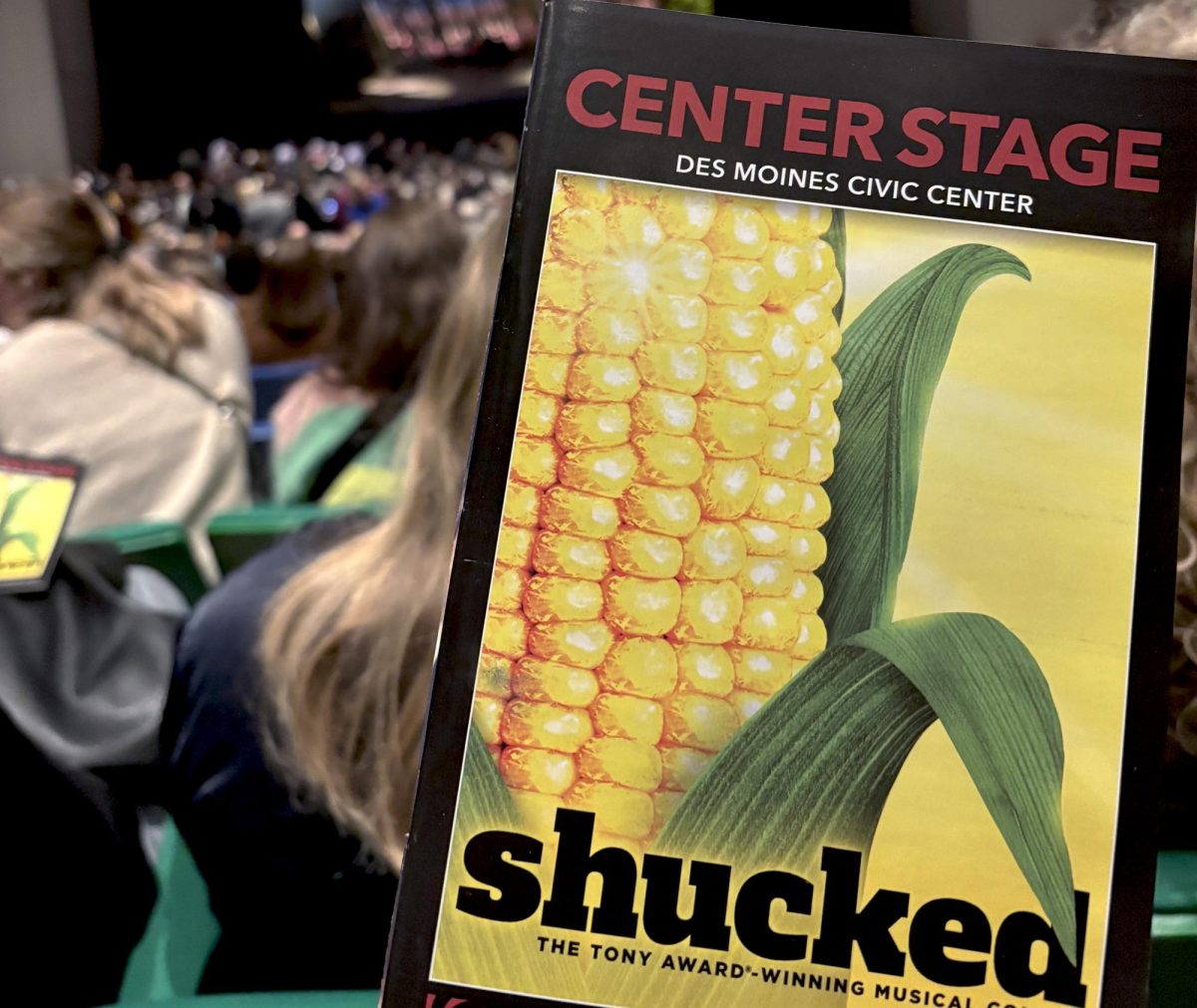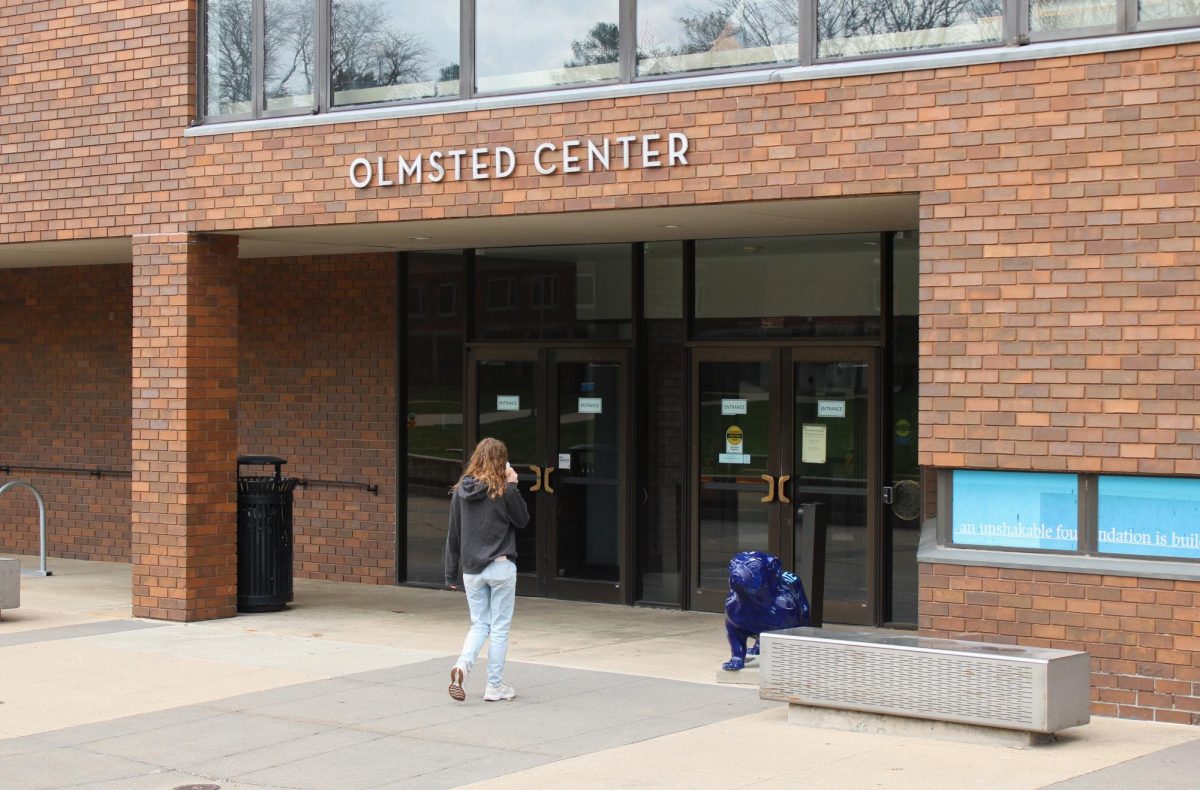The Times-Delphic conducted its annual anonymous survey of faculty sentiments from March 12 to March 25. The survey, sent out to all Drake University faculty members, asked questions related to morale, salary and events from the past year, alongside a spot for respondents to leave thoughts that the survey did not touch upon. None were required to answer any of the questions and could elaborate as much or as little as necessary.
There were a total of 33 responses. Respondents varied in department, position and sentiment. Despite variation in respondents, the majority of sentiments were similar, with respondents generally feeling negative about morale and burnout.
Strategic communications director John Krantz said that administration could not respond to survey respondents’ point at this time as they were conducting their own survey.
Program and budget cuts create faculty fears
Last year, in an attempt to achieve a balanced budget by 2026, Drake eliminated the religion major, the East Asian studies minor and the graduate certificate in evidence-based healthcare. Certain faculty and staff positions were also let go. A second round of program cuts is still possible, according to The Times-Delphic’s previous coverage.
Several faculty members reported taking on additional duties after program cuts and feeling insecure in their job positions.
“My colleagues are super stressed out. Getting a job in academia is extremely difficult, and gaining a new one once one is lost is sometimes impossible, as it creates vicious cycles that make one the less-than-ideal candidate,” one respondent said.
Respondents, including one who was part of deciding program cuts, also said that knowing faculty who were cut made the process more hurtful.
“Cuts drive to the heart of what faculty do. We are limping along. Exhausted,” one respondent said. “Being asked to do more and more work to address the tight spot with no promise that our work pays off. In fact, we have years of evidence to argue that it does not. There is not a lot of joy at work anymore.”
Several faculty members in the survey reported closely examining their personal and retirement budgets and saving more money out of fears of further cuts.
“I know I will not see another raise for the foreseeable future as long as I stay in my position,” one respondent said. “As a single-income household, it becomes difficult to know that my salary will probably not rise ever again and I will have to choose between what I love to do and meeting the needs of a growing family.”
Other respondents reported changes in how they spend money for their classrooms, such as not buying things for end-of-semester parties.
“My students have no idea how broke we all are (and we are broke) and no sense in splurging too much because, frankly, only a couple of students say ‘thank you.’ That’s the sad thing. Students don’t say ‘thank you’ when you cough up $60 for pizza, donuts, whatever,” one respondent said.
Faculty discuss results of The Ones campaign
The Ones campaign began in 2021 with the goal of “transforming lives and strengthening communities,” according to Drake’s campaign website. The initiative ended in October 2024, having raised over $225 million in three years.
One repeated complaint from faculty stated that the allocation of the funds did not go towards balancing the budget.
“Unfortunately, this campaign was totally mismanaged by President Martin,” the faculty member said. “How can we end this major campaign and still not have the resources to pay faculty and staff? The most important things to attract students would have been a new student center and improving FAC — critical needs — and yet, after all this fundraising we did neither!”
Another respondent said the ending results of The Ones campaign were “ridiculous” and didn’t produce anything valuable to its students or faculty, suggesting it shouldn’t have gone towards new buildings.
“Just give [the money] to students and student support and faculty support,” they said. “How many new buildings/construction projects at Drake that have nothing to do with academics [be built]? Meanwhile, I teach in classrooms where the tech fails weekly. What is going on with this place?”
Several faculty members share the belief that more funding should be allocated to general campus maintenance. One respondent points to the science buildings and “their tech being very outdated.”
“I have to reuse disposable materials, design cheaper experiments, and cannot afford to replace all the broken lab tools (pipettes, computers, balances, etc). The funding is definitely not going directly to improving students’ education,” the faculty member said.
In the survey, many faculty members indicated that more money should be allocated to scholarships and general student academic experience funding.
“We make it really difficult for students in the middle class to come to school here and we should do better,” one respondent said.
Faculty morale ranked as low
Faculty respondents generally rated faculty morale as “low” or “very low.”
“Another faculty member said to me recently that they think the typical Drake professor has depression. That feels accurate,” one respondent said.
Common reasons for low morale indicated by survey respondents included salary compared to cost of living, job insecurity after the program cuts and worries about the state of higher education given lower enrollment.
“We see a number of very talented faculty leaving the University, which is disheartening,” one respondent said. “We want to create a great experience for students here at Drake and I’m worried that our lack of common purpose and shared vision for where Drake is going related to this budget crisis creates animosity across units, among faculty of different ranks, among faculty and administration. It creates a very divided university that does not serve the students well.”
Burnout also contributed to low morale, said several respondents. The majority of respondents said that they felt burnout — exhaustion related to work responsibilities, and the majority said that the amount of burnout had increased since the previous year.
“When you’re bankrupt, or the candle is burned down, or the glass is empty — it isn’t easy to get back,” one respondent said.
Some respondents said that their burnout had not increased because they focused on their own mental health.
“My burnout has gotten a little better because I have admitted I am burnt out and tried to accept that this means I simply will not be as good at the parts of my job other than teaching,” one respondent said. “As part of that, I have tried to simply work less, at the cost of being worse at my job, so I can rest more. It’s only gotten a little bit better though.”
Communication from administration and feeling that administration is not taking faculty concerns seriously also factored into low morale, multiple respondents said. The majority of survey respondents said that administrative transparency has declined from previous years.
“I think there is the illusion of communication but no real transparency,” one respondent said. “Many of us have directly asked questions of the provost and dean and those questions have gone [un]answered.”
One respondent said communication has increased since last year, but not in the way they hoped.
“Nothing [administration] communicates is good news,” they said. “When things were great, we heard something a few times per year. Now that things are bad we hear from them all the time. It was almost better when we were annoyed.”
Another respondent stated that the amount of communication isn’t the issue, but the tone behind it. Martin, according to the respondent, communicates in a “disconnected” manner.
“Marty Martin has a vision for this university and he will not be deterred regardless of how misguided that vision may be,” the faculty member said. “Unfortunately, those around him won’t be honest with him about the destructive nature of the fact that he is exceptionally disconnected from the day-to-day activities on this campus.”
Some faculty members reported feeling as if their opinions on university matters don’t hold weight with administration members.
“The real issue is democracy: faculty don’t have much power here. We are supposed to be co-governors of the University, but instead, we are junior partners at best,” one respondent said.
Respondents gave mixed responses on feeling connected to faculty members outside their school and department. Some said that they had friends outside their departments they made efforts to connect with.
“I invest in certain relationships with people across campus, so yes. But there are still dozens of people who I have never met, despite being here for over a decade,” one respondent said.
In October of 2024, the faculty lounge opened in Howard Hall, aiming to provide a space for faculty of all disciplines to gather.
Several respondents reported that they hadn’t been to the lounge either because of schedule issues or existing burnout. However, other respondents said that it was nice to see faculty in “unstructured” ways.
“The need to cultivate a lively, intellectual atmosphere at Drake amongst faculty is ESSENTIAL,” one respondent said. “We cannot research in silos but that’s how it is. It’s lonely and we need support. The lounge may not be the perfect solution but at least someone is trying.”
Other faculty members thought of the lounge as “silly” or “unnecessary” compared to classroom space needs. Others said that Howard Hall was too out of the way, or that the location was uninviting.
“Housing it in an academic building [Howard] that is ‘home’ to many [departments] makes it feel like walking into someone else’s neighborhood,” one respondent said.
Future of the University
Throughout the survey, respondents brought up enrollment, and many indicated that the future of student enrollment was a constant worry. Many discussed the enrollment cliff — the predicted and currently happening drop in college enrollment, both due to population declines and less students choosing to attend college. Respondents said that Drake needed to come up with solutions.
“I think Drake can have an amazing future, but we need to make necessary decisions now. I don’t see those decisions being made by Faculty Senate or other actors with the power to proactively plan for the future,” one respondent said.
Several said they were disappointed in the Board of Trustees’ decision to renew President Marty Martin’s contract.
One respondent described themselves as “demoralized that the Board signed Marty up for another three years. I was so hopeful he was on the way out so we could bring in a real leader who cared about education.”
Faculty respondents also said that they were disappointed in Drake leadership’s priorities for the future, feeling a lack of emphasis on academics and faculty.
“We are in trouble. Either we need to start admitting way more students, which I understand has risks, or we need to really downsize/resize,” one respondent said. “It’s going to be a very different place than alumni remember, and that’s not bad, but survival will require a seismic shift in the way Drake imagines itself (how ‘prestigious’) and how it markets its size. We may not be able to be ‘mid-size’ and ‘comprehensive’ anymore if we don’t have the money to float our programs.”
Many respondents were also unsure of how the character of Drake would change after the budget crisis and upcoming decisions. One faculty member said that students had changed, requiring more “work and attention” from faculty, and others said that the departure of key faculty members had already altered the school’s character.
“I hope it’s still an institution that I’m proud of at the end. Because this Drake University? I don’t know what it stands for,” one respondent said. “Drake seems directionless right now and it needs to be grounded.”















